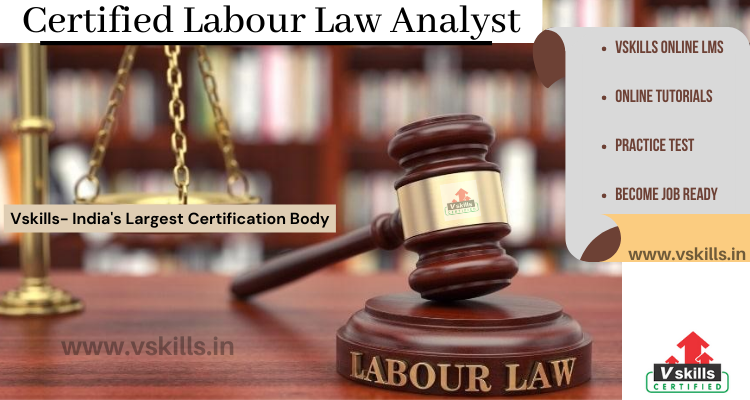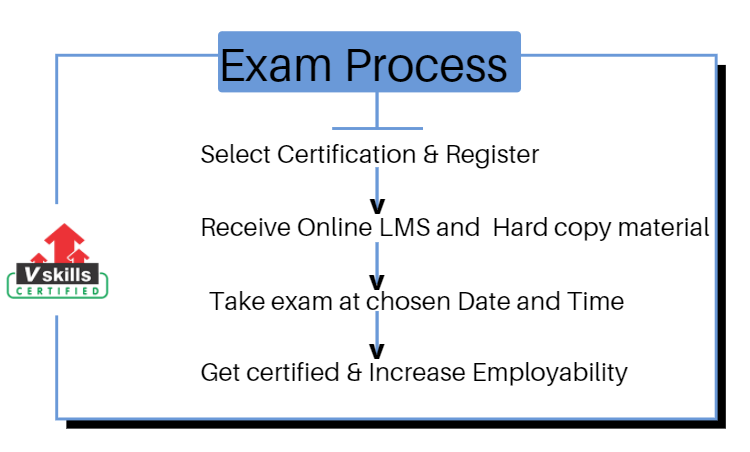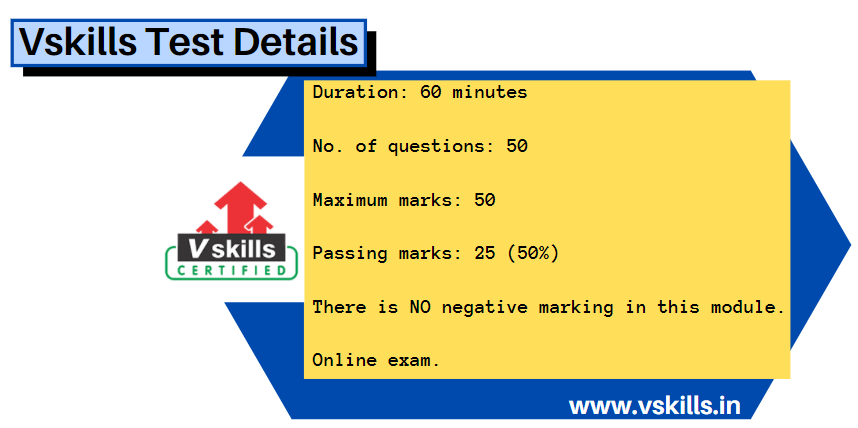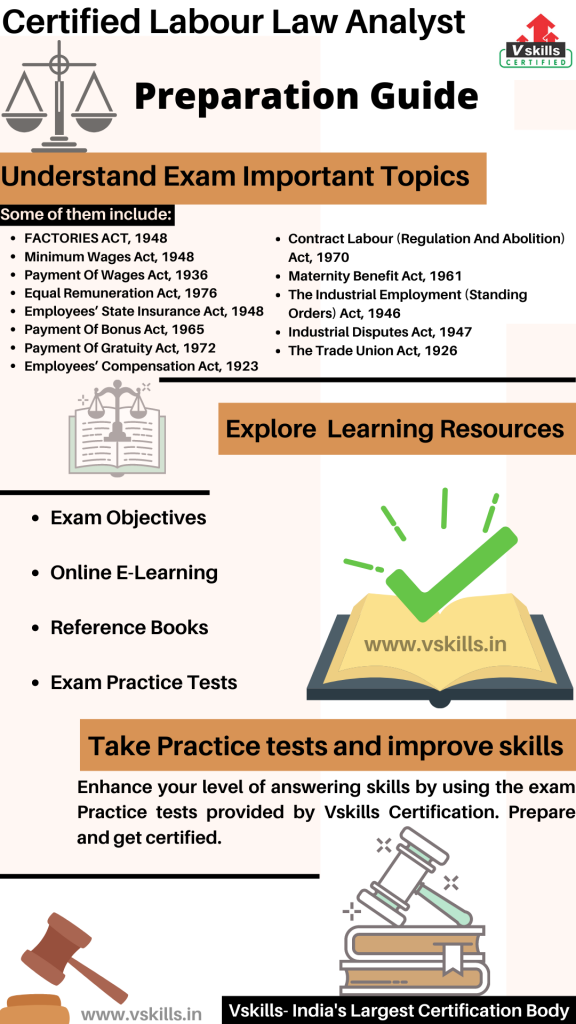
Labour Law analysts work as a part of law firms responsible for designing and conducting labour market research and reporting of labour market conditions and forecasts within specified market sectors. Moreover, they maintain a valid and up to date database of statistical information relevant to socio-economics and labour market forecasting in specified sectors. Further, they participate actively in the ongoing intellectual development and continuous improvement of labour market forecast models, products, and tools. Lastly, they develop labour market intelligence products that contribute to the research priorities of the organization
Vskills Certified Labour Law Analyst: Overview
Vskills Labour Law Analyst certification will help candidates to learn about labor laws. Moreover, the certification validates the candidate’s skills and knowledge on various areas that include industrial relations, trade unions, employers’ federation, collective bargaining, employee grievances, discipline, industrial conflict, ILO, labor welfare and social security.
Candidates earning this certification will get to explore various opportunities in companies specializing in legal-related services & human resource outsourcing constantly hire skilled Labour Law Analysts.

Vskills being India’s largest certification providers gives candidates access to top exams as well as provides after exam benefits. This includes:
- The certifications will have a Government verification tag.
- The Certification is valid for life.
- Candidates will get lifelong e-learning access.
- Access to free Practice Tests.
- Candidates will get tagged as ‘Vskills Certified’ On Monsterindia.com and ‘Vskills Certified’ On Shine Shine.com.

Labour Law Career opportunities
Companies specializing in legal related services & human resource outsourcing constantly hire skilled Labour Law Analysts. Various public and private companies also need Labour Law Analysts for their legal or human resources departments. Let us look at Career opportunities in Labour Law.
Course Outline for Certified Labour Law Analyst
Certified Labour Law Analyst covers the following topics –
1. FACTORIES ACT, 1948
1.1. Important Definitions
1.2. Statutory Agencies And Their Powers For Enforcement Of The Act
1.3. Approval, Licensing, And Registration Of Factories
1.4. Notice By Occupier
1.5. General Duties Of The Occupier
1.6. General Duties Of Manufacturers Etc.
1.7. Measures To Be Taken By Factories For Health, Safety And Welfare Of Workers
1.8. Special Provisions Relating To Hazardous Processes
1.9. Working Hours Of Adults
1.10. Additional Provisions Regulating Employment Of Women In A Factory
1.11. Employment Of Young Persons And Children
1.12. Annual Leave With Wages
1.13. Penalties And Procedures
2. Minimum Wages Act, 1948
2.1. Fixation Of Minimum Rates Of Wages [Section 3(1)(A)]
2.2. Revision Of Minimum Wages
2.3. The Advisory Board
2.4. Payment Of Minimum Wages Is Obligatory On Employer
2.5. Fixing Hours For A Normal Working Day
2.6. Payment Of Overtime
2.7. Wages – less working hours
2.8. Maintenance Of Registers And Records (Section 18)
2.9. Authority And Claims (Section 20-21)
2.10. Offences And Penalties
4. Equal Remuneration Act, 1976
4.1. Act to have overriding effect
4.2. Authorities for hearing and deciding claims and complaints
4.3. Maintenance of Registers
5. Employees’ State Insurance Act, 1948
5.1. Important Definitions
5.2. Employees’ State Insurance Scheme
5.3. Employees’ State Insurance Corporation
5.4. wings of the corporation
5.5. Employees’ State Insurance Fund
5.6. Employees’ Insurance Court (E.I. Court)
6. Employees’ Provident Funds And Miscellaneous Provisions Act, 1952
6.1. Application Of The Act
6.2. Important Definitions
6.3. Schemes Under The Act
6.4. Determination Of Moneys Due From Employers
6.5. Employer Not To Reduce Wages
6.6. Transfer Of Accounts
6.7. Protection Against Attachment
7. Payment Of Bonus Act, 1965
7.1. Object And Scope Of The Act
7.2. Application Of The Act
7.3. Act Not To Apply To Certain Classes Of Employees
7.4. Calculation Of Amount Payable As Bonus
7.5. Eligibility For Bonus And Its Payment
7.6. Bonus Linked With Production Or Productivity
7.7. Penalties
7.8. Compliances Under The Act
8. Payment Of Gratuity Act, 1972
8.1. Application Of The Act
8.2. Who Is An Employee?
8.3. Other Important Definitions
8.4. When Is Gratuity Payable?
8.5. To Whom Is Gratuity Payable?
8.6. The Controlling Authority and the Appellate Authority
8.7. Rights And Obligations Of Employees
8.8. Rights And Obligations Of The Employer
9. Employees’ Compensation Act, 1923
9.1. Object And Scope
9.2. Definitions
9.3. DISABLEMENT
9.4. EMPLOYER’S LIABILITY FOR COMPENSATION
9.5. Employer’s Liability When Contractor Is Engaged
9.6. Compensation
9.7. Obligations And Responsibility Of An Employer
9.8. Notice And Claim
9.9. Medical Examination
9.10. Procedure In The Proceedings Before The Commissioner
9.11. Appeals
9.12. Penalties
9.13. Special Provisions Relating To Masters And Seamen
9.14. Special Provisions Relating To Captains And Other Members Of Crew Of Aircrafts
9.15. Special Provisions Relating To Employees Aboard Of Companies And Motor Vehicles
10. Contract Labour (Regulation And Abolition) Act, 1970
10.1. Important Definitions
10.2. The Advisory Boards
10.3. Registration Of Establishments Employing Contract Labour
10.4. Effect Of Non-Registration
10.5. Appointment Of Licensing Officer And Licensing Of Contractors
10.6. Welfare And Health Of Contract Labour
10.7. Rules Framed Under The Act By The Central Government On The Question Of Wages
10.8. Penalties And Procedure
10.9. Inspectors
10.10. Maintenance Of Records & Registers
11. Maternity Benefit Act, 1961
11.1. Introduction
11.2. Right to payment of maternity benefits
11.3. Notice of claim for maternity benefit
11.4. The penalty for contravention of Act by an employer
12. THE CHILD LABOUR (PROHIBITION AND REGULATION) ACT, 1986
12.1. Prohibition of employment of children in certain occupations and processes
13. The Industrial Employment (Standing Orders) Act, 1946
13.1. Important Definitions
13.2. Certification Of Draft Standing Orders
13.4. Duration And Modification Of Standing Orders
13.5. Payment Of Subsistence Allowance
13.6. Temporary application Of Model Standing Orders
14. Industrial Disputes Act, 1947
14.1. Introduction
14.2. Object And Significance Of The Act
14.3. Important Definitions
14.4. Types Of Strike And Their Legality
14.5. Dismissal Etc. Of An Individual Workman To Be Deemed To Be An Industrial Dispute
14.6. Authorities Under The Act And Their Duties
14.7. Reference Of Disputes
14.8. Voluntary Reference Of Disputes To arbitration
14.9. Strikes And Lock-Outs
14.10. Justified And Unjustified Strikes
14.11. Wages For Strike Period
14.12. Dismissal Of Workmen And Illegal Strike
14.13. Change In Conditions Of Service
14.14. Penalties
15. The Trade Union Act, 1926
15.1. Mode of registration
15.2. Provisions contained in the rules of a Trade Union
15.3. Certificate of Registration
15.4. Cancellation of registration
16. THE LABOUR LAWS (EXEMPTION FROM FURNISHING RETURNS AND MAINTAINING REGISTER BY CERTAIN ESTABLISHMENTS) ACT, 1988
16.1. Exemption from returns and registers required under certain labour laws
17. EMPLOYMENT EXCHANGES (COMPULSORY NOTIFICATION OF VACANCIES) ACT, 1959
17.1. DEFINITIONS
17.2. Act not to apply in relation to certain vacancies
17.3. Employers to furnish information and returns in a prescribed form
18. Apprentices Act, 1961
18.1. Definitions
18.2. Obligations of employers
18.3. Payment to apprentices
18.4. Authorities under the Act
18.5. Offences and penalties
18.6. Offences by companies
19. Audit Under Labour Legislations
19.1. Introduction
19.2. Methodology Of Conduct Of Labour Audit
19.3. Benefits Of Labour Audit
Preparation Guide for Vskills Certified Labour Law Analyst
Candidates preparing for the exam should understand the importance of exam resources. During the exam preparation, it is essential to get all the required exam study resources. This will provide an advantage to understand the concepts and meaning more accurately. In the Certified Labour Law Analyst exam preparation guide, we will discuss some of the most important resources to help you prepare well for the exam.

Study Resource: Exam Objectives
For every examination, the first task should be to get all the exam related details including the important contents and its topic. This will help candidates to easily start preparing for the exam and to understand things more accurately. For the Certified Labour Law Analyst exam the topics include:
- FACTORIES ACT, 1948
- Minimum Wages Act, 1948
- Payment Of Wages Act, 1936
- Equal Remuneration Act, 1976
- Employees’ State Insurance Act, 1948
- Payment Of Bonus Act, 1965
- Payment Of Gratuity Act, 1972
- Employees’ Compensation Act, 1923
- Contract Labour (Regulation And Abolition) Act, 1970
- Maternity Benefit Act, 1961
- The Industrial Employment (Standing Orders) Act, 1946
- Industrial Disputes Act, 1947
- The Trade Union Act, 1926
Refer: Certified Labour Law Analyst Brochure
Study Resource: Vskills Online LMS
Vskills Certified Labour Law Analyst provides candidates access to prepare for the exam using the online learning material for a lifetime. The online material for this is regularly updated. Furthermore, e-learning is bundled with hard copy material which helps candidates to improve and update the learning curve for superior and better opportunities.
Refer: Certified Labour Law Analyst Sample Chapters
Study Resource: Books for Reference
Reference Books can provide an advantage to learn and understand things more accurately. For the Certified Labour Law Analyst exam, there are various books available which you can find online or in libraries. Some of the books are as follows:
- Industrial Relations and Labour Laws, 6th Edition Book by S. C. Srivastava
- Compliances Under Labour Laws Book by H.L. Kumar
Study Resource: Practice Test
After understanding and learning about the Certified Labour Law Analyst exam topics, it is time for practice tests. That is to say, practice tests are important for better preparation as by assessing yourself with these tests you will know about your weak and strong areas. Moreover, you improve your answering skills for getting better results. So, make sure to find the best practice sources.
Prepare for Job Interview
Checkout these online job interview questions on Labour law to upgrade your knowledge and become job ready, checkout now.




